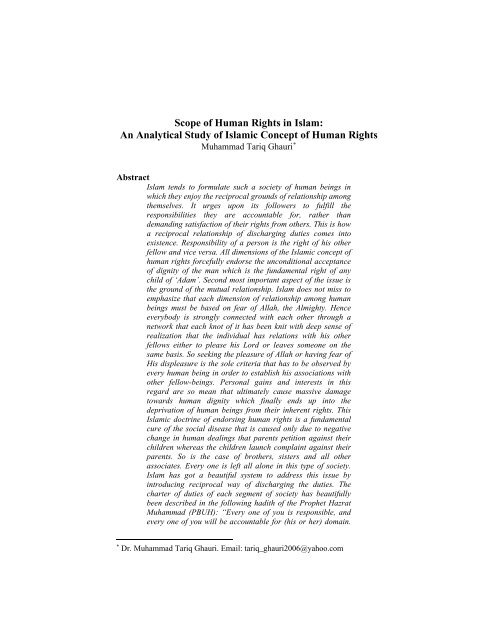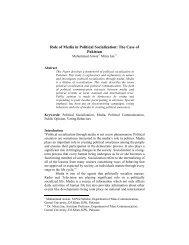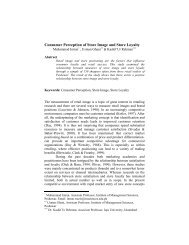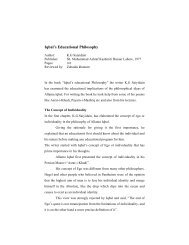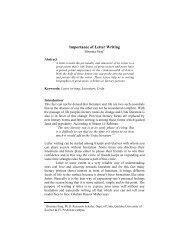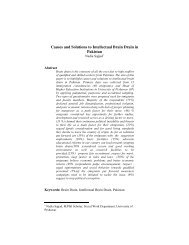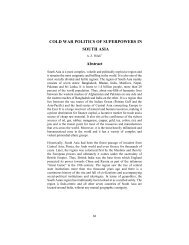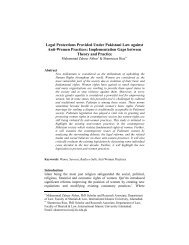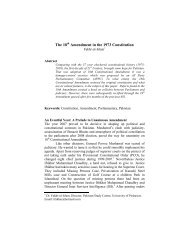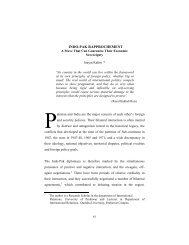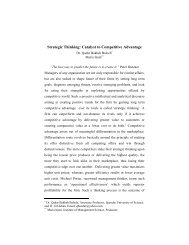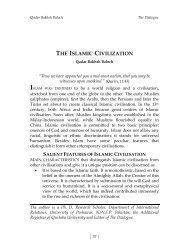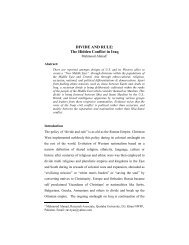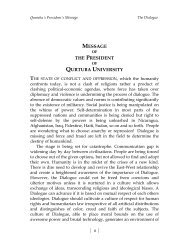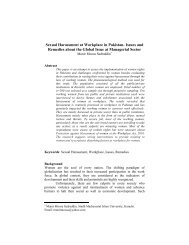An Analytical Study of Islamic Concept of Human Rights
An Analytical Study of Islamic Concept of Human Rights
An Analytical Study of Islamic Concept of Human Rights
Create successful ePaper yourself
Turn your PDF publications into a flip-book with our unique Google optimized e-Paper software.
Scope <strong>of</strong> <strong>Human</strong> <strong>Rights</strong> in Islam:<br />
<strong>An</strong> <strong>An</strong>alytical <strong>Study</strong> <strong>of</strong> <strong>Islamic</strong> <strong>Concept</strong> <strong>of</strong> <strong>Human</strong> <strong>Rights</strong><br />
Muhammad Tariq Ghauri ∗<br />
Abstract<br />
Islam tends to formulate such a society <strong>of</strong> human beings in<br />
which they enjoy the reciprocal grounds <strong>of</strong> relationship among<br />
themselves. It urges upon its followers to fulfill the<br />
responsibilities they are accountable for, rather than<br />
demanding satisfaction <strong>of</strong> their rights from others. This is how<br />
a reciprocal relationship <strong>of</strong> discharging duties comes into<br />
existence. Responsibility <strong>of</strong> a person is the right <strong>of</strong> his other<br />
fellow and vice versa. All dimensions <strong>of</strong> the <strong>Islamic</strong> concept <strong>of</strong><br />
human rights forcefully endorse the unconditional acceptance<br />
<strong>of</strong> dignity <strong>of</strong> the man which is the fundamental right <strong>of</strong> any<br />
child <strong>of</strong> ‘Adam’. Second most important aspect <strong>of</strong> the issue is<br />
the ground <strong>of</strong> the mutual relationship. Islam does not miss to<br />
emphasize that each dimension <strong>of</strong> relationship among human<br />
beings must be based on fear <strong>of</strong> Allah, the Almighty. Hence<br />
everybody is strongly connected with each other through a<br />
network that each knot <strong>of</strong> it has been knit with deep sense <strong>of</strong><br />
realization that the individual has relations with his other<br />
fellows either to please his Lord or leaves someone on the<br />
same basis. So seeking the pleasure <strong>of</strong> Allah or having fear <strong>of</strong><br />
His displeasure is the sole criteria that has to be observed by<br />
every human being in order to establish his associations with<br />
other fellow-beings. Personal gains and interests in this<br />
regard are so mean that ultimately cause massive damage<br />
towards human dignity which finally ends up into the<br />
deprivation <strong>of</strong> human beings from their inherent rights. This<br />
<strong>Islamic</strong> doctrine <strong>of</strong> endorsing human rights is a fundamental<br />
cure <strong>of</strong> the social disease that is caused only due to negative<br />
change in human dealings that parents petition against their<br />
children whereas the children launch complaint against their<br />
parents. So is the case <strong>of</strong> brothers, sisters and all other<br />
associates. Every one is left all alone in this type <strong>of</strong> society.<br />
Islam has got a beautiful system to address this issue by<br />
introducing reciprocal way <strong>of</strong> discharging the duties. The<br />
charter <strong>of</strong> duties <strong>of</strong> each segment <strong>of</strong> society has beautifully<br />
been described in the following hadith <strong>of</strong> the Prophet Hazrat<br />
Muhammad (PBUH): “Every one <strong>of</strong> you is responsible, and<br />
every one <strong>of</strong> you will be accountable for (his or her) domain.<br />
∗ Dr. Muhammad Tariq Ghauri. Email: tariq_ghauri2006@yahoo.com
Scope <strong>of</strong> <strong>Human</strong> <strong>Rights</strong> in Islam:<br />
<strong>An</strong> <strong>An</strong>alytical <strong>Study</strong> <strong>of</strong> <strong>Islamic</strong> <strong>Concept</strong> <strong>of</strong> <strong>Human</strong> <strong>Rights</strong><br />
Muhammad Tariq Ghauri<br />
Hence the head <strong>of</strong> the state is responsible and he will be<br />
accountable, the man is guardian and will be accountable for<br />
his area <strong>of</strong> responsibility, the wife is in command to take care<br />
<strong>of</strong> her husband’s home and she will be accountable, the<br />
servant is custodian <strong>of</strong> the property <strong>of</strong> his master and will be<br />
asked about his discharge <strong>of</strong> duties. Behold! Hence each one<br />
<strong>of</strong> you is responsible, and will be answerable for (his or her)<br />
domain.” 1<br />
Keywords: Islam, Holy Quran, <strong>Rights</strong>, Justice, Ihsan<br />
Introduction<br />
Islam is custodian <strong>of</strong> dignity and respect for human beings. It has got the<br />
dynamic spirit to safeguard the mutual rights, honour and the promotion<br />
<strong>of</strong> permanent values in human society. The topic <strong>of</strong> <strong>Human</strong> <strong>Rights</strong> is one<br />
<strong>of</strong> the most important and latest contents <strong>of</strong> the modern times’ discussions<br />
which determine the standing <strong>of</strong> any country and nation in the present<br />
world. However Islam is the only bright and brilliant civilization that<br />
embraces this concept from the day one that rises on horizon <strong>of</strong> the<br />
universe and brightens and enlightens with its shining and vibrant rays as<br />
it has been mentioned in the holy Quran: “<strong>An</strong>d indeed We have honoured<br />
the Children <strong>of</strong> Adam”. 2<br />
Similarly a crystal example from the early social life <strong>of</strong> the holy<br />
Prophet Hazrat Muhammad (PBUH) that in the age <strong>of</strong> 20 years only, 20<br />
years before his Prophethood, he participated in an ‘oath ceremony’<br />
known as ‘ ‘Half-ul-Fuzool’. 3 in the history. This ceremony took place in<br />
the house <strong>of</strong> Abdullah Bin Judaa (PBUH) 4 and the oath was aimed at<br />
maintaining the peace, dignity and mutual respect among the fighting<br />
elements and forces <strong>of</strong> Arabs. The issue was so significant that the holy<br />
Prophet Hazrat Muhammad (PBUH) says:<br />
“I witnessed the oath in the house <strong>of</strong> Abdullah Bin<br />
Judaan. I would not be willing to withdraw from the<br />
honour <strong>of</strong> being one <strong>of</strong> the participants <strong>of</strong> the occasion<br />
even in lieu <strong>of</strong> the heavy compensations <strong>of</strong> a flock <strong>of</strong> red<br />
camels, and If some one appeals for assistance in the<br />
name <strong>of</strong> that oath even in <strong>Islamic</strong> era, I would extend my<br />
help to him.” 5<br />
The elation <strong>of</strong> the holy Prophet Hazrat Muhammad (PBUH) in regard<br />
with the oath is quite understandable if the contents <strong>of</strong> the oath are<br />
comprehended which are:<br />
The Dialogue 315<br />
Volume V Number 4
Scope <strong>of</strong> <strong>Human</strong> <strong>Rights</strong> in Islam:<br />
<strong>An</strong> <strong>An</strong>alytical <strong>Study</strong> <strong>of</strong> <strong>Islamic</strong> <strong>Concept</strong> <strong>of</strong> <strong>Human</strong> <strong>Rights</strong><br />
Muhammad Tariq Ghauri<br />
“Witness to Allah! Together we all would rise and we<br />
would keep making efforts against the suppressor till he<br />
delivers the rights to the oppressed one. This oath would<br />
not cease to exist till oceans would continue wetting the<br />
oysters and the mountains <strong>of</strong> Makkah firmly keep kissing<br />
the heavens with their l<strong>of</strong>ty tops and till our economy is<br />
based on social equality.” 6<br />
The spirit <strong>of</strong> the oath is to accentuate and warranty the assurance <strong>of</strong><br />
provisions <strong>of</strong> the human rights even in the days when the world was<br />
unable to comprehend the meaning <strong>of</strong> rights. The holy Prophet Hazrat<br />
Muhammad (PBUH) picked up the forceful significance <strong>of</strong> the oath and<br />
appreciated it even when he was only 20 years old. His association with<br />
the oath is a true reflection <strong>of</strong> his 23 years long Prophetic struggle that<br />
ultimately ended up in bringing about such a revolution that safeguarded<br />
the human rights in true letters and spirits.<br />
Status <strong>of</strong> <strong>Human</strong> Being<br />
Before we come to discuss the subject under discussion, it is essential to<br />
know about the rank and stature <strong>of</strong> the man that has been bestowed upon<br />
him by Islam among other creatures. In fact the idea <strong>of</strong> human rights in<br />
Islam is based on respect, dignity and equality that he has been appointed<br />
as the vicegerent <strong>of</strong> Allah soon after the occurrence <strong>of</strong> his special creation<br />
as it has been manifested in the holy Quran: “<strong>An</strong>d (remember) when your<br />
Lord said to the angels: Verily, I am going to appoint a vicegerent on the<br />
earth.” 7 On the creation <strong>of</strong> Adam followed by clear and loud declaration<br />
on account <strong>of</strong> his appointment as the Vicegerent <strong>of</strong> Allah, the angels were<br />
asked to prostrate before him in order to establish his significant decorum<br />
as it is stated in the holy Quran: “<strong>An</strong>d (remember) when We said to the<br />
angels: Prostrate yourselves before Adam.” 8<br />
This first chapter <strong>of</strong> human existence has an adequate amount <strong>of</strong><br />
evidence to establish the superiority and supremacy <strong>of</strong> Adam to all<br />
creatures and other forces in the universe. This has been mentioned in the<br />
holy Quran as per following: “<strong>An</strong>d indeed We have hnoured the Children<br />
<strong>of</strong> Adam.” 9<br />
In this verse the fact has been revealed that Allah (SWT) has very<br />
kindly blessed the children <strong>of</strong> Adam with ingrained nobility and dignity<br />
without referring them to mere external factor connected to the social or<br />
material stature. So every misconception <strong>of</strong> dignity based on wealth or<br />
family background has forcefully been denied in Islam. Hence every child<br />
<strong>of</strong> Adam was granted the most respectable place in the society under the<br />
The Dialogue 316<br />
Volume V Number 4
Scope <strong>of</strong> <strong>Human</strong> <strong>Rights</strong> in Islam:<br />
<strong>An</strong> <strong>An</strong>alytical <strong>Study</strong> <strong>of</strong> <strong>Islamic</strong> <strong>Concept</strong> <strong>of</strong> <strong>Human</strong> <strong>Rights</strong><br />
Muhammad Tariq Ghauri<br />
dynamic and revolutionary cover <strong>of</strong> this verse until he proves himself<br />
otherwise. So the verse has its deductions that enable the human history to<br />
qualify the following significant criteria based on social practice in<br />
human life:<br />
No Scope for Aristocratic Approach in Islam<br />
All human beings are from the same origin. The holy Quran testifies this<br />
theory on practical grounds as Allah addresses the mankind in the<br />
following vivacious verse: “O mankind! Be dutiful to your Lord, Who<br />
created you from a single person (Adam), and from him (Adam), He<br />
created his wife [Hawwa] (Eve).” 10<br />
No Room for Ethnic or Territorial Supremacy<br />
Similar to the previous point, it is worthy to note that Islam does not<br />
permit any ethnic prejudice to barricade the way <strong>of</strong> provision <strong>of</strong> rights to<br />
all human beings on equal grounds. All children <strong>of</strong> Adam enjoy the rights<br />
<strong>of</strong> dignity and honour. The holy Quran says: “O mankind! We have<br />
created you from a male and female, and made you into nations and<br />
tribes, that you may know one another.” 11<br />
The holy Quran enlightens us that all human beings are from one<br />
male and female. So there is no question for any existence <strong>of</strong> class<br />
differences among them. As far as the differences based on family<br />
backgrounds and different segment <strong>of</strong> society are concerned, it is<br />
important only to know each other. This does not mean at all to cause<br />
differences among them. Similar and same spirit can be observed in the<br />
last sermon <strong>of</strong> the holy Prophet Hazrat Muhammad when he was<br />
addressing his noble and loyal companions. His voice was loud and clear<br />
while he said, “O mankind! Behold! indeed your Lord is one and no<br />
doubt your father is one” 12<br />
Belief in one and the only Lord and concept <strong>of</strong> one father<br />
formulate the sense <strong>of</strong> universal brotherhood and weld the entire mankind<br />
in such a strong thread <strong>of</strong> relationship which keeps them well joined to<br />
each other with harmony and unity based on belief. How pretty this<br />
slogan is to unite the mankind, the children <strong>of</strong> Adam! [It may be<br />
underlined that all Muslims are our brothers in faith; while non-Muslims<br />
are our brothers in creation] “One Lord, one father. One Lord, one<br />
father.” After few utterance <strong>of</strong> the same slogan, one must realize and<br />
enjoy the deep sense <strong>of</strong> strength <strong>of</strong> oneness <strong>of</strong> mankind and universal<br />
brotherhood. This is a dream and cherished desire <strong>of</strong> Islam to maintain<br />
and upkeep this strongly welded oneness <strong>of</strong> entire mankind on the basis<br />
<strong>of</strong> belief <strong>of</strong> oneness <strong>of</strong> Allah. The hadith reveals both spiritual and<br />
material aspects as the one Lord satisfies the belief system <strong>of</strong> the mankind<br />
The Dialogue 317<br />
Volume V Number 4
Scope <strong>of</strong> <strong>Human</strong> <strong>Rights</strong> in Islam:<br />
<strong>An</strong> <strong>An</strong>alytical <strong>Study</strong> <strong>of</strong> <strong>Islamic</strong> <strong>Concept</strong> <strong>of</strong> <strong>Human</strong> <strong>Rights</strong><br />
Muhammad Tariq Ghauri<br />
and concept <strong>of</strong> one fatherhood makes them synchronized under one<br />
strong fiber <strong>of</strong> brotherhood. The holy Quran does give importance to this<br />
point and addresses the entire mankind numerously. Sometimes with the<br />
expression <strong>of</strong> “O mankind!” and sometimes with the slogan <strong>of</strong> “O<br />
children <strong>of</strong> Adam!” 13<br />
NO Arrogance / Superiority Based on Colour / Beauty<br />
Similarly every child <strong>of</strong> Adam has been created good looking. No one can<br />
claim extra ordinary privileges on the basis <strong>of</strong> his view about himself that<br />
he is more beautiful than others. It is clearly mentioned in the holy Quran:<br />
“Verily We created the man in the best stature (mould)” 14<br />
Same concept has been emphasized in the last sermon <strong>of</strong> the holy<br />
Prophet forcefully to deny all the standards <strong>of</strong> priority which have no<br />
involvement <strong>of</strong> human efforts and just enable them enjoy special<br />
privileges based on only born traits and features and it sets the common<br />
standards <strong>of</strong> honour and dignity which are achievable by all human beings<br />
with hard work and actions. The holy Prophet emphasized: “Behold! No<br />
Arab is superior to any non Arab, and no non Arab is superior to any<br />
Arab, neither the red is superior to the black nor black has any superiority<br />
to any red, but due to only piety” 15<br />
Try to explore the brilliant point that establishes the unique<br />
standard <strong>of</strong> superiority and honour which is linked with piety. Work and<br />
hard work (actions) are the only standard to fortify the standing <strong>of</strong> any<br />
human without discrimination <strong>of</strong> gender. The holy Quran says: “<strong>An</strong>d for<br />
all, there will be degrees according to that which they did, that He (Allah)<br />
may recompense them in full for their deeds. <strong>An</strong>d they will not be<br />
wronged.” 16 One and the same standard for both man and woman has been<br />
ensured which is stated in another verse <strong>of</strong> the holy Quran: “For men<br />
there is a reward for what they have earned, and (likewise) for women<br />
there is a reward for what they have earned.” 17<br />
All human beings are equal and the only difference in their ranks<br />
will be determined by virtue <strong>of</strong> their righteous deeds. <strong>An</strong>d these deeds<br />
will be hung to their neck & they will be punished or rewarded on the<br />
basis <strong>of</strong> their deeds. This is the message that one easily learns from the<br />
verses mentioned above, and the message <strong>of</strong> the last sermon <strong>of</strong> the holy<br />
Prophet needs not to be emphasized in this reference.<br />
Employment <strong>of</strong> all Universal Resources for the Service <strong>of</strong> all <strong>Human</strong><br />
Beings on Equal Grounds<br />
Above all, Allah (SWT) affirms the fact in His divine Book repeatedly<br />
that all resources <strong>of</strong> the universe have been dedicated for the service <strong>of</strong> all<br />
The Dialogue 318<br />
Volume V Number 4
Scope <strong>of</strong> <strong>Human</strong> <strong>Rights</strong> in Islam:<br />
<strong>An</strong> <strong>An</strong>alytical <strong>Study</strong> <strong>of</strong> <strong>Islamic</strong> <strong>Concept</strong> <strong>of</strong> <strong>Human</strong> <strong>Rights</strong><br />
Muhammad Tariq Ghauri<br />
human beings equally. Every body has all rights <strong>of</strong> access to reach and<br />
approach the resources available in the universe on equal basis. Allah has<br />
already made every thing available, dutiful and submissive to all without<br />
any discrimination. The only task which is left to the man is to explore the<br />
opportunities to make the things in his favour. Let us read the holy Quran<br />
in this regard: “He it is Who created for you all that is on the earth.” 18<br />
Same has been repeated in the holy Quran in another fashion: “See you<br />
not (O man!) that Allah has subjected for you whatsoever is in the<br />
heavens and whatsoever is in the earth.” 19<br />
One Origin <strong>of</strong> the Entire Mankind<br />
The above mentioned points qualify man to enjoy all rights and rewards<br />
in life without any discrimination. This is how Islam successfully kills all<br />
kinds <strong>of</strong> discriminations which hinder the smooth provision or simply<br />
cause deprivation <strong>of</strong> rights to the mankind. All discriminatory possible<br />
sources to promote status oriented differences in human society, mere<br />
gender based discrimination, or the differences which <strong>of</strong>ten appear on<br />
ethnic grounds or generated on the basis <strong>of</strong> colour and language were<br />
strictly banned and every possible practice was eliminated and strictly<br />
proscribed. Islam has the pride to rise with its shining rays to enlighten<br />
the universe and to release the mankind from the oppressive clutches <strong>of</strong><br />
brutal and cruel systems that deprived them from their rights. Now<br />
onwards no concept was to exist to deprive anyone from his or her rights<br />
regardless <strong>of</strong> the fact whosoever he or she is, whether male or female, rich<br />
or poor, black or white or belongs to east or west. The message was loud<br />
and clear that “All human beings are children <strong>of</strong> Adam and Adam was<br />
made from clay”. 20<br />
This cancelled all self drawn outlines by the human mind to<br />
formulate the society as his will and wish. The declaration aimed at lifting<br />
up the status <strong>of</strong> the man and not to let him become slave <strong>of</strong> a man like<br />
him. Even the Prophet was not granted the license to proclaim his<br />
mastership over others. The holy Quran says: It is not (possible) for any<br />
human being to whom Allah has given the Book and Al-Hukm 21 (the<br />
knowledge and understanding <strong>of</strong> the laws <strong>of</strong> religion) and Prophethood to<br />
say to the people: “Be my worshippers rather than Allah’s.” On the<br />
contrary (he would say): “Be ‘Rabbaniyyeen’.” 22 “When you made the<br />
people slaves, whereas their mothers had conceived them free.” 23<br />
In order to support the noble cause <strong>of</strong> human liberty, the prophet<br />
hood is aimed and this one <strong>of</strong> its major goals is that the Prophet is deputed<br />
to his Ummah to liberate them from the clutches <strong>of</strong> slavery by playing his<br />
significant and vibrant role as the commissioned one by Allah. See what<br />
The Dialogue 319<br />
Volume V Number 4
Scope <strong>of</strong> <strong>Human</strong> <strong>Rights</strong> in Islam:<br />
<strong>An</strong> <strong>An</strong>alytical <strong>Study</strong> <strong>of</strong> <strong>Islamic</strong> <strong>Concept</strong> <strong>of</strong> <strong>Human</strong> <strong>Rights</strong><br />
Muhammad Tariq Ghauri<br />
the holy Quran says: “He releases them from their heavy burdens and<br />
from the fetters (bindings) that were upon them.” 24<br />
In the light <strong>of</strong> the above mentioned facts, <strong>Islamic</strong> concept <strong>of</strong> human rights<br />
emerges before the reader in the glaring following bullets:<br />
Dignity <strong>of</strong> mankind<br />
The theory <strong>of</strong> human rights in fact depends to be established on provision<br />
<strong>of</strong> inherent respect to the mankind. No concept <strong>of</strong> human rights could be<br />
implemented practically until and unless the honour <strong>of</strong> human beings is<br />
determined in the general spectrum. The only privilege for any individual<br />
to enjoy superiority to his or her fellow beings is the ‘Piety’. The holy<br />
Quran does not validate any provision for any preference to be given to<br />
any one other than piety. It is expressed in the holy Quran: “Verily, the<br />
most honourable <strong>of</strong> you with Allah is that who is the most pious amongst<br />
you.” 25<br />
Equality <strong>of</strong> all <strong>Human</strong> Beings<br />
The obvious end result for the inherent dignity <strong>of</strong> entire mankind is social<br />
equality. Superiority and point <strong>of</strong> preference is only piety and hard work.<br />
The holy Quran has this good news for the humanity: “<strong>An</strong>d for all, there<br />
will be degrees according to that which they did.” 26<br />
Liberty and freedom<br />
Islam broke all idols and librated the mankind from oppression <strong>of</strong> all<br />
types <strong>of</strong> exploitations as one <strong>of</strong> the most significant and major role <strong>of</strong> the<br />
Prophethood was decided by Allah: “He releases them from their heavy<br />
burdens and from the fetters (bindings) that were upon them.” 27<br />
This obviously resulted in the absolute freedom <strong>of</strong> the mankind<br />
from the bloody clutches <strong>of</strong> all other forces than the actual force and that<br />
is the real Lord: Allah.<br />
Brotherhood<br />
It is not only brotherhood that Islam promotes through its revolutionary<br />
and progressive programme, but Islam calls upon the humanity to believe<br />
in one Lord and one father belief system that converts all different colours<br />
<strong>of</strong> children <strong>of</strong> Adam submitting to one Lord and descending to one father.<br />
This belief system gathers them despite the physical distance based on<br />
geographical units. This pearls the mankind into one race thread. This is<br />
how a nation comes into being with a brilliant identity mark <strong>of</strong><br />
‘Brotherhood’ under the shade <strong>of</strong> the holy Quran. The holy Quran says:<br />
“The believers are nothing else than brothers.” 28<br />
The Dialogue 320<br />
Volume V Number 4
Scope <strong>of</strong> <strong>Human</strong> <strong>Rights</strong> in Islam:<br />
<strong>An</strong> <strong>An</strong>alytical <strong>Study</strong> <strong>of</strong> <strong>Islamic</strong> <strong>Concept</strong> <strong>of</strong> <strong>Human</strong> <strong>Rights</strong><br />
Muhammad Tariq Ghauri<br />
How beautifully this verse ties the people living in one belief system with<br />
each other through the connection that denies all kinds <strong>of</strong> differences.<br />
This forceful might <strong>of</strong> <strong>Islamic</strong> belief system has been reflected in the<br />
following hadith <strong>of</strong> the Prophet (PBUH):<br />
“Verily the believer is like a strong building that its some part strengthens<br />
its other part.” 29<br />
This hadith is enlightening us that as each and every unit <strong>of</strong> the<br />
building causes strength for the other unit by joining strongly with each<br />
other, the concept <strong>of</strong> comprehensive brotherhood emerges under the<br />
umbrella <strong>of</strong> <strong>Islamic</strong> belief system that denies every possible disparity<br />
which has even the slightest potential to damage the fabric <strong>of</strong> this<br />
brotherhood.<br />
Justice<br />
Injustice is one <strong>of</strong> the serious threats that hamper the smooth promotion<br />
<strong>of</strong> human rights in the society. How Islam could have afforded to<br />
overlook this important social aspect. Hence it urges to go to any extent<br />
for the effective execution <strong>of</strong> the provisions <strong>of</strong> <strong>Islamic</strong> system <strong>of</strong> Social<br />
Justice. Same spirit can be observed in the event <strong>of</strong> theft when a lady<br />
named ‘Fatimah’ from a respectable family was caught alleged.<br />
Allegation was proved and the Prophet (PBUH) was approached not to<br />
cut her hand. The Prophet (PBUH) got angry and uttered sentence that set<br />
an indiscriminatory pattern <strong>of</strong> the society. He said: “<strong>An</strong>d by God! If<br />
Fatimah daughter <strong>of</strong> Muhammad (PBUH) had committed the theft, I<br />
would have cut her hand also.” 30<br />
Why should not have happened this all episode in this fashion<br />
when the paved foundation was already laid down by the holy Quran<br />
itself. It draws our attention: “Say (O Muhammad! (PBUH): “My Lord<br />
has commanded justice.” 31<br />
“<strong>An</strong>d give full measure and full weight with justice.” 32<br />
“Indeed, We have sent Our Messengers with clear pro<strong>of</strong>s, and revealed<br />
with them the Scripture and the Balance (justice) that mankind may keep<br />
up justice.” 33<br />
"O you who believe! Stand out firmly for justice, as witnesses to Allah;<br />
even though it be against yourselves, or your parents, or your kin, be he<br />
rich or poor, Allah is a Better Protector to both (than you).” 34<br />
“O you who believe! Stand out firmly for for Allah as just witness, and let<br />
not the enmity and hatred <strong>of</strong> others make you avoid justice. Be just: that is<br />
nearer to piety; and fear Allah.” 35<br />
The Dialogue 321<br />
Volume V Number 4
Scope <strong>of</strong> <strong>Human</strong> <strong>Rights</strong> in Islam:<br />
<strong>An</strong> <strong>An</strong>alytical <strong>Study</strong> <strong>of</strong> <strong>Islamic</strong> <strong>Concept</strong> <strong>of</strong> <strong>Human</strong> <strong>Rights</strong><br />
Muhammad Tariq Ghauri<br />
No Compulsion in Deen (Freedom <strong>of</strong> Religion)<br />
In spite <strong>of</strong> the fact that Islam rightly believes that it is the only and the<br />
latest version <strong>of</strong> divine message which has been enjoyed by Allah, and no<br />
other religion is acceptable for the solution <strong>of</strong> the entire mankind, but it<br />
does not allow its followers to exercise any authority to compel any non<br />
Muslim to convert himself to Islam. This Quranic statement pertains to a<br />
crystal and clear stance about the subject. The holy Quran says: “There is<br />
no compulsion in religion.” 36<br />
The message reflected out <strong>of</strong> this text provides a strong<br />
foundation to establish a strong structure <strong>of</strong> co existence and tolerance in<br />
a way that no one has any license to compel anyone to be converted<br />
forcefully. This socio religio base is provided to avoid any unfortunate<br />
occurrence based on any intolerant event to hinder the provision <strong>of</strong> the<br />
fundamental right <strong>of</strong> religion in <strong>Islamic</strong> society.<br />
Unique System <strong>of</strong> Social Justice<br />
Keeping in view the comprehensive social justice system provided by the<br />
holy Quran and Sunnah <strong>of</strong> the holy Prophet, one can easily conclude that<br />
this is only Islam that stops all sort <strong>of</strong> discrimination and hurdle in the<br />
way <strong>of</strong> provisioning <strong>of</strong> justice. This is to ensure provision <strong>of</strong> rights to all<br />
human beings regardless <strong>of</strong> the fact that some one has got enmity against<br />
anyone, or some decision may result against one’s own interests or his<br />
relatives or parents. It is emphasized that Allah deserves more to be taken<br />
care <strong>of</strong>f than all other relations and associations. It means that provision<br />
<strong>of</strong> justice to the mankind is actually to protect Allah’s respect and His<br />
rights. This concept <strong>of</strong> linking human rights with the rights <strong>of</strong> Allah<br />
Almighty and His dignity is a unique feature <strong>of</strong> <strong>Islamic</strong> practical norms<br />
that makes every follower <strong>of</strong> Islam so responsible and conscious to avoid<br />
the breaching <strong>of</strong> the <strong>Islamic</strong> identity and discipline. The holy Quran<br />
further puts emphasize to furnish this topic with His following divine<br />
orders: ‘‘Verily, Allah commands that you render back the trusts to those<br />
whom they are.” 37 It is further described in the holy Quran: ‘‘Verily,<br />
Allah commands justice the doing <strong>of</strong> good.” 38<br />
The divine injunction to observe justice in due course <strong>of</strong> trust<br />
rendering and provision <strong>of</strong> rights to the deserving people, which is further<br />
followed by another supplementary divine ruling <strong>of</strong> doing good (Ihsan) is<br />
obvious and clear in its meanings. If justice is missing in rendering <strong>of</strong><br />
services, this obviously means deprivation <strong>of</strong> the people <strong>of</strong> their rights.<br />
Justice (Adl) is soul <strong>of</strong> rendering <strong>of</strong> services and provision <strong>of</strong> rights. But<br />
Ihsan is essence <strong>of</strong> justice (Adl). Adl is mere provisioning <strong>of</strong> exact rights<br />
to whom they are, but doing well in this context means to do some thing<br />
more positive and constructive and to sacrifice one’s own rights for other<br />
The Dialogue 322<br />
Volume V Number 4
Scope <strong>of</strong> <strong>Human</strong> <strong>Rights</strong> in Islam:<br />
<strong>An</strong> <strong>An</strong>alytical <strong>Study</strong> <strong>of</strong> <strong>Islamic</strong> <strong>Concept</strong> <strong>of</strong> <strong>Human</strong> <strong>Rights</strong><br />
Muhammad Tariq Ghauri<br />
fellows. This aims at evading the society from any possible venture <strong>of</strong><br />
selfish approach and to instill such practices that every human being must<br />
preemptively initiate discharge <strong>of</strong> obligations on his part to pay the rights<br />
<strong>of</strong> others even by sacrificing his own rights.<br />
Conclusion<br />
One can easily learn and infer that the society based on justice (Adl),<br />
doing good (Ihsan) and reciprocal grounds <strong>of</strong> discharge <strong>of</strong> obligations and<br />
rendering <strong>of</strong> services always enjoys a peaceful life without any fear <strong>of</strong><br />
clash <strong>of</strong> interests. <strong>Human</strong> beings in this society live under the dynamic<br />
shield <strong>of</strong> divine guidance <strong>of</strong> Allah and no one can damage this stuff and<br />
break this rope that its one side is strongly held by the believers and the<br />
other is held with Allah. Similarly the <strong>Islamic</strong> concept <strong>of</strong> human rights is<br />
factually based on eternality and sanctity. It is because this does not base<br />
on any human legislation, but this is sanctioned, approved and further<br />
provisioned by the Almighty Allah, the Sustainer and the Cherisher <strong>of</strong> all<br />
the worlds. No law <strong>of</strong> any land or legislative or constitutional forum<br />
neither can undo it nor is authorized to legislate against its spirit. The<br />
wide range <strong>of</strong> this comprehensive concept <strong>of</strong> human rights in Islam has<br />
been embodied under the dynamic and divine spirit <strong>of</strong> the last sermon <strong>of</strong><br />
the holy Prophet where he declared these rights unable to be ceased until<br />
some one is proven guilty for dishonouring the same. He said that<br />
“If the people keep discharging their duties, testifying<br />
the ‘Oneness <strong>of</strong> Allah’ and the ‘Prophethood <strong>of</strong><br />
Muhammad (PBUH) keep <strong>of</strong>fering the prayers and<br />
observing the fasting, the right <strong>of</strong> their lives and<br />
properties will be protected under the safe custody and<br />
guard <strong>of</strong> Islam except those who are proved otherwise to<br />
breach the discipline and dishonour the clause <strong>of</strong><br />
protection <strong>of</strong> other’s life and property.” 39<br />
Same spirit can be observed in clause 63 <strong>of</strong> Medina pact. It was stated<br />
that: “<strong>An</strong>d this is a full guarantee from Allah and Muhammad (PBUH)<br />
the messenger <strong>of</strong> Allah, for provisioning <strong>of</strong> all rights to those who stand<br />
loyal and firm to the piety and good deeds.” 40<br />
This guarantee and assurance <strong>of</strong> life and respect and provisioning<br />
<strong>of</strong> all human rights is absolute excluding one point and that if some one is<br />
not loyal to the <strong>Islamic</strong> state and the system being operated under its<br />
dynamic divine guidance. This theory <strong>of</strong> being loyal to the <strong>Islamic</strong> state<br />
can easily be derived from the above stated text because it not only<br />
Muhammad (PBUH) alone in person is mentioned in the clause to provide<br />
The Dialogue 323<br />
Volume V Number 4
Scope <strong>of</strong> <strong>Human</strong> <strong>Rights</strong> in Islam:<br />
<strong>An</strong> <strong>An</strong>alytical <strong>Study</strong> <strong>of</strong> <strong>Islamic</strong> <strong>Concept</strong> <strong>of</strong> <strong>Human</strong> <strong>Rights</strong><br />
Muhammad Tariq Ghauri<br />
warrantee <strong>of</strong> all rights with Allah, but it is Muhammad as the ‘Messenger<br />
<strong>of</strong> Allah ’ stands with this assurance.<br />
Hence it is proved that the way Islam stands to provision the<br />
rights <strong>of</strong> all human beings in the light <strong>of</strong> direct and divine guidance <strong>of</strong><br />
revelation <strong>of</strong> Allah, and no system can be compared with it as there being<br />
a strong possibility <strong>of</strong> the involvement <strong>of</strong> human sentiments to protect<br />
one’s own benefits or at least favouritism.<br />
The Dialogue 324<br />
Volume V Number 4
Scope <strong>of</strong> <strong>Human</strong> <strong>Rights</strong> in Islam:<br />
<strong>An</strong> <strong>An</strong>alytical <strong>Study</strong> <strong>of</strong> <strong>Islamic</strong> <strong>Concept</strong> <strong>of</strong> <strong>Human</strong> <strong>Rights</strong><br />
Muhammad Tariq Ghauri<br />
Notes & References<br />
1 Al-Bukhari, Muhammad Bin Ismail, Imam, As-Saheeh: hadith No. 4892,<br />
p:1988/5. Abu Daud, Sulayman Bin Ashas, Imam, As-Sunan: hadith<br />
No.2928,p:130/3<br />
2 Al-Quran, Bani Israeel, 17: 70<br />
3 ‘Half-ul-Fuzool’: This oath took place in the month <strong>of</strong> Z-ul-Qaadah (20 years<br />
before the Prophethood) soonafter the battle <strong>of</strong> Fijar which took place in the<br />
month <strong>of</strong> Shaban. This oath is famous with this name because it was executed<br />
and administered due to the untiring efforts <strong>of</strong> the three persons whose names<br />
were commonly sharing the substance <strong>of</strong> ‘FAZL’, those were: Al-Fazl Bin<br />
Fuzalah, Al-Fazl Bin Widaah and Al-Fazl Bin Qudhaah For ref pl see Ibne<br />
Hisham, Abdul Malik, As-Seerah <strong>An</strong>-Nabawiyyah, Dar-ul-Kitab il Arabi,<br />
Beirut, Lebanon.1429 HIjri/2008. p: 90/1 and see Tabari, Ibne Jareer, Imam:<br />
Tareekh-ul- Umam Wal-Mulook, p:302/2 and Hasan Ibrahim Hasan: Tareekhul-Islam,<br />
p:205/1.<br />
4 Abdullah Bin Judaan Taymee: son <strong>of</strong> the paternal uncle <strong>of</strong> Hazrat Ayeshah<br />
(RA). He is famous in the history because <strong>of</strong> his generosity and hospitality. Pl.<br />
see Ibne Hisham, As-Seerah <strong>An</strong>-Nabawiyyah,p:91/1<br />
5 ibid. This was narrated by Ibne Is-haq on authority <strong>of</strong> Hazrat Talhah Bin<br />
Abdullah, Tabiee without mentioning the name <strong>of</strong> Sahabi. So this hadith is<br />
Mursal, not Marfoo.<br />
6 ibid.<br />
7 Al-Quran, Al-Baqarah, 2:30<br />
8 Al-Quran, Al-Baqarah, 2:34<br />
9 Al-Quran, Bani Israeel, 17: 70<br />
10 Al-Quran, <strong>An</strong>-Nisa,4:1<br />
11 Al-Quran, Al-Hujurat,49:13<br />
12 Ahmad Bin Hambal, Imam, Al-Musnad: Hadith No. 23536, p:411/5; Abu<br />
Nuaim, Hilyat-ul-Awliya,p:100/3; Munziree, At-Targheb Wat-<br />
Tarheeb,p:375/3; Al-Haithami, Majma-uz-Zawaid, p:346/6 and 266/8; Ibn-ul-<br />
Hajr Al-Asqalani, Fath-ul-Bari, 527/6;Jalal-ud-Din As-Suyooti, Ad-Durr-ul-<br />
Manthoor Fit-Tafseeri Bil-Mathoor , p:98/6; Ash-Shaukani, Nail-ul-Awtar,<br />
p:164/5<br />
13 For reference pl see: Muhammad Fuad Abdul Baqi:Al-Mujam-ul-Mufahras Li<br />
Alfaz-il-Quran-il-Kareem, Dar-ul-<strong>An</strong>dlus Lit-Tabaah wan-Nashr wat-Tawzee,<br />
Beirut, Lebanon, p: 110-111 and 137 respectively.<br />
14 Al-Quran, At-Teen,95:4<br />
15 Ahmad Bin Hambal, ibid.<br />
16 Al-Quran, Al-Ahqaf,46:19<br />
17 Al-Quran, <strong>An</strong>-Nisa,4:32<br />
18 Al-Quran, Al-Baqarah,2:29<br />
19 Al-Quran, Luqman,31:20<br />
20 Ibne Abi Hatim Ar-Razi, As-Siqat, p:55/2; Ibne Katheer,Ima-dud-Din, Al-<br />
Bidayah wan-Nihayah, p:301/4<br />
21 Al-Quran, Aale-Imran, 3:79<br />
The Dialogue 325<br />
Volume V Number 4
Scope <strong>of</strong> <strong>Human</strong> <strong>Rights</strong> in Islam:<br />
<strong>An</strong> <strong>An</strong>alytical <strong>Study</strong> <strong>of</strong> <strong>Islamic</strong> <strong>Concept</strong> <strong>of</strong> <strong>Human</strong> <strong>Rights</strong><br />
Muhammad Tariq Ghauri<br />
22 ‘Rabbaniyyeen’ is plural <strong>of</strong> ‘Rabbani.’ This is an attributed noun towards<br />
‘Rab’. It means those who belong to Allah.<br />
23 Ibne Katheer, Imam, Albidayah Wan-Nihayah,p:3,4/5; Ibn-ul- Jauzi, Seerah<br />
<strong>of</strong> Umar, p:29; Further see: Muhammad Husain Haikal, Al-Farooq Umar, p:2.<br />
1998.<br />
24 Al-Quran, Al-Araf, 7:157<br />
25 A-Quran, Al-Hujurat,49:13<br />
26 Al-Quran, Al-Ahqaf,46:19<br />
27 Al-Quran, Al-Araf, 7:157<br />
28 Al-Quran, Al-Hujurat,49:10<br />
29 Bukhari, As-Saheeh, hadith No. 467, p: 182/1; Muslim Bin Al-Hajjaj Al-<br />
Qusheri, As-Saheeh, hadith No. 2585, p: 1999/4; Muhammad Bin Esa At-<br />
Tirmizee, As-Sunan, hadith No.1928, p: 325/4; Abdur Rahman <strong>An</strong>-Nisai, As-<br />
Sunan, hadith No. 2560, p: 79/5<br />
30 Bukhari, As-Saheeh, hadith No. 3288, p: 1882/3; Muslim As-Saheeh, hadith<br />
No. 1688, p: 1315/3; At-Tirmizee, As-Sunan, hadith No.1430, p: 37/4<br />
31 Al-Quran, Al-Araf,7: 29<br />
32 Al-Quran, Al-<strong>An</strong>aam,6:152<br />
33 Al-Quran, Al-Hadeed,57:25<br />
34 Al-Quran, <strong>An</strong>-Nisa,4:135<br />
35 Al-Quran, Al-Maidah,5:8<br />
36 Al-Quran,Al-Baqarah,2:256<br />
37 Al-Quran, <strong>An</strong>-Nisa,4:58<br />
38 Al-Quran, <strong>An</strong>-Nahl,16:90<br />
39 Ibne Hisahm, As-Seerah <strong>An</strong>-Nabawiyyah, (Last Sermon <strong>of</strong> the Holy<br />
Prophet),p:35/3 and Ibne Hazm Al-Qurtubi, Hijjat-ul-Wida, Bait-ul-Afkar Wal-<br />
Adillah Lin-Nashri Wat-Tauzee, 1988<br />
40 Ibid, p:135/4<br />
The Dialogue 326<br />
Volume V Number 4
Scope <strong>of</strong> <strong>Human</strong> <strong>Rights</strong> in Islam:<br />
<strong>An</strong> <strong>An</strong>alytical <strong>Study</strong> <strong>of</strong> <strong>Islamic</strong> <strong>Concept</strong> <strong>of</strong> <strong>Human</strong> <strong>Rights</strong><br />
Muhammad Tariq Ghauri<br />
Bibliography<br />
The Holy Quran<br />
Abu Daud,Sulayman Bin Ash-as, Imam: As-Sunan, Dar-ul-Fikr, Beirut,<br />
Lebanon, 1414 Hijri/ 1994.<br />
Nisai, Abu Abd-ur-Rahman Ahmad Bin Shuaib: As-Sunan, Dar-ul-<br />
Kutub-il-Ilmiyyah, Beirut, Labanon, 1416 Hijri/1995.<br />
Abu Nuaim, Ahmad Bin Abd Ullah Bin Ahmad: Hilyat-ul-Awliya wa<br />
Tabaqat-lu- Asfia, Dar-ul-Kitab-il-Arabi, Beirut, Labanon, 1400 Hijri/<br />
1980.<br />
Ahmad Bin Hambal, Abu Abd-Ullah Bin Muhammad, Imam: Al-Musnad,<br />
Al-Maktab-ul-Islami, Beirut, Lebanon, 1398 Hijri/ 1978.<br />
Al-Haithami, Noor-ud-Din Abul Hasan Ali Bin Abi Bakr: Majma-uz-<br />
Zawaid, Dar-ul-Kitab-il-Arabi, Beirut, Lebanon, 1407 Hijri/1987.<br />
Ash-Shaukani, Muhammad Bin Ali Bin Muhammad: Nail-ul-Awtar<br />
Sharh-u- Muntaq-al-Akhbar, Dar-ul-Fikr, Beirut, Lebanon, 1402<br />
Hijri/1982.<br />
Bukhari, Muhammad Bin Ismail, Imam: As- Saheeh,Dar-ul-Kutub-il-<br />
Ilmiyyah, Beirut, Lebanon, 1401 Hijir/ 1981.<br />
Hasan Ibrahim Hasan: Tareekh-ul-Islam, Daru Ihya-it-Turas-il-Arabi,<br />
Beirut, Labanon,1967.<br />
Ibn u Abi Hatim Ar-Razi, Abu Muhammad Abdur Rahman As-Siqat, Dar<br />
u Ihya-it-Turas-il-Arabi, 1371 hijri/1952.<br />
Ibn-ul-Hajr Al-Asqalani, Hafiz, Ahmad Bin Ali: Fath-ul-Bari, Daru<br />
Nashr-il-Kutub-il-Islamiyyah, Lahore, Pakistan,1401 Hijri/1981<br />
Ibne Hisham, Abu Muhammad Abd-ul-Malik Himyari: As-Seerah <strong>An</strong>-<br />
Nabawiyyah, Dar-ul-Kitab il Arabi, Beirut, Lebanon, 1429 Hijri/2008.<br />
Ibne Hazm Al-Qurtubi: Hijjat-ul-Wida, Bait-ul-Afkar Wal-Adillah Lin-<br />
Nashri Wat-Tauzee, 1988 Riyadh, KSA.<br />
The Dialogue 327<br />
Volume V Number 4
Scope <strong>of</strong> <strong>Human</strong> <strong>Rights</strong> in Islam:<br />
<strong>An</strong> <strong>An</strong>alytical <strong>Study</strong> <strong>of</strong> <strong>Islamic</strong> <strong>Concept</strong> <strong>of</strong> <strong>Human</strong> <strong>Rights</strong><br />
Muhammad Tariq Ghauri<br />
Ibn-ul- Jauzi, Abul- Farj, Abdu Rahman: Manaqib Ameerir-il-<br />
Mumineen Umar Bin Al- Khattab, Dar-ul-Kutub-il-Ilmiyyah, Beirut,<br />
labanon.<br />
Ibne Katheer, Abul-Fida Ismail Bin Umar, Imam: Albidayah Wan-<br />
Nihayah, Dar-ul-Fikr, Beirut, Labanon, 1419 Hijri/1998.<br />
Jalal-ud-Din As-Suyooti: Ad-Durr-ul-Manthoor Fit-Tafseeri Bil-Mathoor,<br />
Dar-ul-Marifah, Beirut, Labanon.<br />
Muhammad Bin Esa At-Tirmizee: Al-Jami As-Saheeh, Dar-ul-Gharb-il-<br />
Islami, Beirut, Labanon, 1998.<br />
Muhammad Fuad Abdul Baqi: Al-Mujam-ul-Mufahras Li Alfaz-il-Quranil-Kareem,<br />
Dar-ul-<strong>An</strong>dlus Lit-Tabaah wan-Nashr wat-Tawzee, Beirut,<br />
Labanon<br />
Haikal, Muhammad Husain: Al-Farooq Umar, Dar-ul-Maarif, Egypt.<br />
Munziree,Abu Muhammad Abd-ul-Azeem Bin Abd-ul-Qavi: At-Targheb<br />
Wat-Tarheeb, Dar-ul-Kutub-il-Ilmiyyah, Beirut, Labanon, 1417 Hijri.<br />
Muslim Bin Al-Hajjaj Al-Qusheri: As-Saheeh, Dar-u- Ihya-it-Turas-il-<br />
Arabi, Beirut, Labanon.<br />
Tabari, Abu Jaafar Muhammad Bin Jareer, Imam: Tareekh-ul- Umam<br />
Wal-Mulook, 1407 Hijri, Beirut, Labanon.<br />
The Dialogue 328<br />
Volume V Number 4


